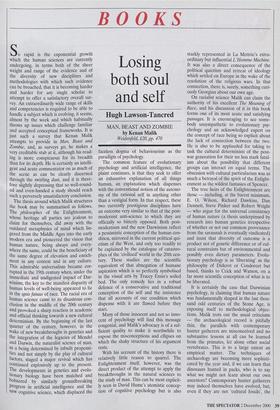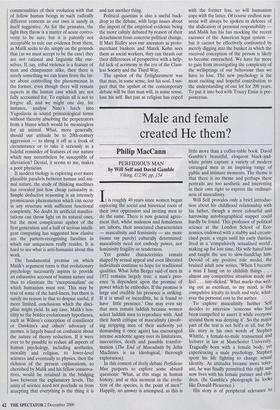Losing both soul and self
Hugh Lawson-Tancred
MAN, BEAST AND ZOMBIE by Kenan Malik Weidenfeld, .£20, pp. 470 o rapid is the exponential growth which the human sciences are currently undergoing, in terms both of the sheer weight and range of the evidence and of the diversity of new disciplines and methodologies with which such evidence can be broached, that it is becoming harder and harder for any single scholar to attempt to offer a satisfactory overall sur- vey. An extraordinarily wide range of skills and competencies is required to be able to handle a subject which is evolving, it seems, almost by the week and which habitually throws up issues which challenge familiar and accepted conceptual frameworks. It is just such a survey that Kenan Malik attempts to provide in Man, Beast and Zombie, and, as surveys go, he makes a very creditable stab at it, although his read- mg is more conspicuous for its breadth than for its depth. He is certainly an intelli- gent and acute commentator on as much of the scene as can be clearly discerned through the swirling dust, and it is there- fore slightly depressing that so well-round- ed and even-handed a study should reach such a perversely unsatisfactory conclusion.
The thesis around which Malik structures the book may be summarised as follows. The philosopher of the Enlightenment, whose heritage all parties are jealous to claim for themselves, did away with the outdated metaphysics of mind which lin- gered from the Middle Ages into the early modern era and pioneered the vision that human nature, being always and every- where the same, could be the beneficiary of the same degree of elevation and enrich- ment in any context and in any culture. This admirable universalism became cor- rupted in the 19th century when, under the immediate and undigested impact of Dar- winism, the key to the manifest disparity of human levels of well-being appeared to lie in the ignis fatuus of race. The racial era of human science came to its disastrous con- clusion in the middle of the 20th century and provoked a sharp reaction in academic and official thinking towards a new cultural determinism. By the beginning of the last quarter of the century, however, in the wake of new breakthroughs in genetics and the integration of the legacies of Mendel and Darwin, the naturalist science of man, as a being determined by inbuilt propensi- ties and not simply by the play of cultural factors, staged a major revival which has continued explosively up to the present. The developments in genetics and evolu- tionary biology have been matched and bolstered by similarly groundbreaking Progress in artificial intelligence and the new cognitive science, which displaced the
faceless dogma of behaviourism as the paradigm of psychology.
The common feature of evolutionary psychology and artificial intelligence, the plaint continues, is that they seek to offer an exhaustive explanation of all things human, an explanation which dispenses with the conventional notion of the autono- my of the rational self in anything other than a vestigial form. In that respect, these two currently prestigious disciplines have an outcome very similar to that of the post- modernist anti-science to which they arc officially so bitterly opposed. Both post- modernism and the new Darwinism reflect a pessimistic conception of the human con- dition, mirrored in the current political qui- etism of the West, and only too readily to be explained by the catalogue of catastro- phes of the 'civilised' world in the 20th cen- tury. These studies are the scientific equivalent of that abnegation of humane aspiration which is so perfectly symbolised in the visual arts by Tracey Emin's soiled bed. The only remedy lies in a robust defence of a conservative and traditional conception of the self and the insistence that all accounts of our condition which dispense with it are flawed before they start.
Many of those innocent and not so inno- cent of psychology will find this message congenial, and Malik's advocacy is of a suf- ficient quality to make it worthwhile to ex-pose the misconceptions and ellipses on which the shaky structure of his argument rests.
With his account of the history there is relatively little reason to quarrel. The Enlightenment itself, however, was the direct product of the attempt to apply the breakthroughs in the natural sciences to the study of man. This can be most explicit- ly seen in David Flume's atomistic concep- tion of cognitive psychology but is also
starkly represented in La Mettrie's extra- ordinary but influential L'Homtne Machine. It was also a direct consequence of the political quietism and retreat of ideology which settled on Europe in the wake of the resolution of the religious wars. In that connection, there is, surely, something curi- ously Georgian about our own age.
On racialist science Malik can claim the authority of his excellent The Meaning of Race, and his discussion of it in this book forms one of its most acute and satisfying passages. It is encouraging to see some- body unsympathetic to evolutionary psy- chology and an acknowledged expert on the concept of race being so explicit about the lack of connection between the two. He is also to be applauded for taking to task the cultural determinists of the post- war generation for their no less stark fatal- ism about the possibility that different groups can interact on equal terms. The obsession with cultural particularism was as much a betrayal of the spirit of the Enlight- enment as the wildest fantasies of Spencer.
The true heirs of the Enlightenment are those — including, at the barest minimum, E. O. Wilson, Richard Dawkins, Dan Dennett, Steve Pinker and Robert Wright — who argue for the universal consistency of human nature (a thesis underpinned by research into human genetics irrespective of whether or not our common provenance from the savannah is eventually vindicated) and insist that diversity of outcome is a product not of genetic difference or of cul- tural constraints but of environmental and possibly even dietary parameters. Evolu- tionary psychology is as 'liberating' as the philosophy of Diderot or Condorcet but based, thanks to Crick and Watson, on a far more scientific conception of what is to be liberated.
It is certainly the case that Darwinian psychology, in claiming that human nature was fundamentally shaped in the last thou- sand odd centuries of the Stone Age, is exposing itself to methodological objec- tions. Malik trots out the usual criticisms — the archaeological record is pitifully thin, the parallels with contemporary hunter gatherers are misconceived and no substantive lessons at all can be learned from the primates, let alone other social vertebrates. This is to a large extent an empirical matter. The techniques of archaeology are becoming more sophisti- cated by the year and, if we can learn that dinosaurs hunted in packs, who is to say what we might not learn about our own ancestors? Contemporary hunter gatherers may indeed themselves have evolved, but, even if they are not 'cultural fossils', the commonalities of their evolution with that of fellow human beings in such radically different contexts as our own is surely in itself suggestive. As for the primates, the light they throw is a matter of acute contro- versy to be sure, but it is patently not acceptable to rule out evidence from them, as Malik seeks to do, simply on the grounds that (as we must accept to be the case) they are not rational and linguistic like our- selves. If, say, tribal violence is a feature of man and chimpanzee alike, then there is surely something we can learn from the lat- ter about controlling the phenomenon in the former, even though there will remain aspects in the human case which are not fully accounted for. To explain all is not to forgive all, and we might one day, for instance, analyse Nato's lurch into Yugoslavia in sound primatological terms without thereby absolving the perpetrators from a blame which would be meaningless for an animal. What, more generally, should our attitude be to 20th-century aggression — to shrug it off as a freak of circumstance or to take it seriously as a baleful reminder of features of our nature which may nevertheless be susceptible of alleviation? Denial, it seems to me, makes a poor physician.
If modern biology is exploring ever more plausible parallels between human and ani- mal nature, the study of thinking machines has revealed just how cheap rationality is. Simple deductive reasoning is an intensely promiscuous phenomenon which can occur in any structure with sufficient functional complexity. No doubt its artificial manifes- tations can throw light on its natural ones, but the most conspicuous upshot of the first generation and a half of serious intelli- gent computing has suggested how elusive are the pattern-recognising faculties in which our uniqueness really resides. It is hard to see what is anti-humanist about this work.
The fundamental premise on which Malik's argument turns is that evolutionary psychology necessarily aspires to provide an exhaustive account of human nature and thus to eliminate the 'exceptionalism' on which humanism must rest. This may be true of some of the hard-liners, but there is surely no reason in that to despise useful, if more limited, conclusions which the disci- pline might yield. In any case, Malik's hos- tility to the bolder evolutionary hypotheses, such as Wilson's conception of consilience or Dawkins's and others' advocacy of memes, is largely based on confusion about the nature of theory reduction. If it were ever to be possible to reduce all aspects of human psychology, including aesthetics, morality and religion, to lower-level sciences and eventually to physics, then the richness of the present explanations, so cherished by Malik and his fellow conserva- tives, would be retained in the bridging laws between the explanatory levels. The unity of science need not preclude us from accepting that everything is the thing it is and not another thing.
Political quietism is also a useful back- drop to the debate, with large issues about the import of the empirical evidence being the more calmly debated by reason of their detachment from concrete political change. If Matt Ridley sees our ancestors as proto- merchant bankers and Marek Kohn sees them as social workers, they can thrash out their differences of perspective with a help- ful lack of acrimony in the era of the Class- less Society and the Third Way.
The upshot of the Enlightenment was that man, in some sense, lost his soul. I sus- pect that the upshot of the contemporary debate will be that man will, in some sense, lose his self. But just as religion has coped with the former loss, so will humanism cope with the latter. Of course endless non- sense will always be spoken in defence of the abdication of personal responsibility — and Malik has his fun mocking the recent excesses of the American legal system — but it cannot be effectively confronted by merely digging into the bunker in which the received conception of the person is likely to become entrenched. We have far more to gain from investigating the complexity of the wellsprings of our behaviour than we have to lose. The new psychology is the most exciting and hopeful contribution to the understanding of our lot for 200 years. To put it into bed with Tracey Emin is pre- posterous.



















































































 Previous page
Previous page